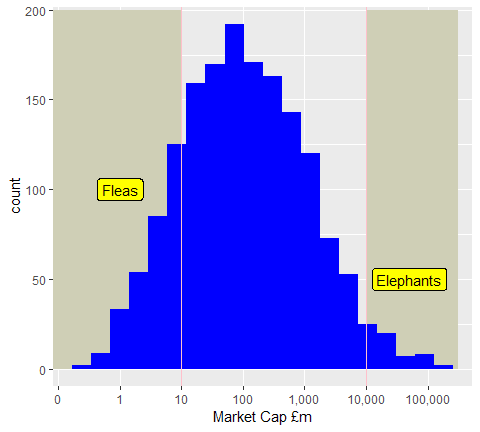I first came to the thoughts in this post when I noticed that for the universe of stocks that I track, the median Quality Rank was about 63 rather than 50 as you would expect. So I decided to have a look at how the QVM ranks change with Market Cap, as my universe is limited to stocks with Market Caps over about £90m.
Jim Slater famously said that "elephants don't gallop" to describe the fact that share prices of large market cap stocks tend to move slowly. He later extended this by adding that "fleas can jump many times their own body height" to describe the behaviour of micro-cap share prices.
The implication is that small cap stocks and micro-cap stocks can provide much better returns than the blue chips. However this is a simplification of the true situation.
The distribution of Market Caps in the market: fleas, elephants and woolly mammoths

Slater defined an elephant as a stock with a market cap above about £5bn to £10bn and a flea as a stock with a market cap below about £5m to £10m.
These definitions correspond to the bottom 10% and top 5% of the UK stock market as you can see in the histogram. The elephants roughly correspond to the FTSE100.
This histogram has a log scale for the x-axis. Elephants are 1,000 to 10,000 times bigger than fleas.
The median market cap is about £100m. In other words, half of the companies have a market cap below £100m and half above £100m.
However because this is a log-normal distribution, if we ask about the balance of money across the market we get a different result.
If we ask for the market cap where half of the total value of the market is above that value and half below that value, it is at about £28bn. To put it another way, the top twenty stocks account for half of the total value of the market and the remaining 1600+ stocks account for the other half.
So half the stock market's total capitalisation is not even all the elephants. You just need the twenty heaviest elephants - the "woolly mammoths" of the stock market absolutely dominate a weighted index.
The question to consider is whether fleas really are a better bet than elephants. So now let's look at the…









